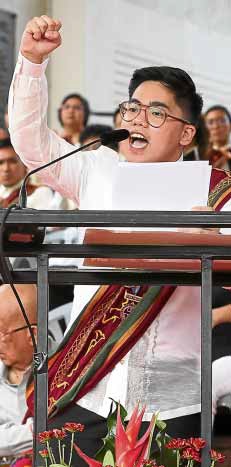MANILA, Philippines — Home comes in different forms for Joshua Emmanuelle Ramos, a University of the Philippines (UP) Diliman philosophy major who earned a general weighted average of 1.0966.
Ramos, 20, was one of the 55 students conferred with the highest Latin honors in UP this year when the most number of graduates were merited with the academic honor of summa cum laude in the university’s history.
But as he delivered his valedictory address in front of 3,980 other graduates at the University Amphitheater on Sunday, he took the task of reexamining the values of the institution they’d learned to call home, at a time when the rule of law was in peril and democracy was being challenged.
“A child’s capacity to love is shaped at home. The same is true with UP, where academics are tied with social realities in order to cultivate the Iskolar ng Bayan’s love for the country,” Ramos said in his speech written in Filipino.
For the young philomath, UP resembles home by giving students the freedom to ask the how’s and why’s of life, where they are allowed to criticize, analyze and speak their minds.
Father’s advice
“One time, I was asked: Why do UP students always question the government that funds their education? Isn’t that the same as disrespecting our parents?” Ramos said in his speech.
“But I remembered what my father told me. He never taught me not to talk back. He would always say: Always answer with respect. This means that as long as we respect others, there’s nothing wrong with asking and examining the things around us. With this tradition, UP has served as a bastion of democracy. As hope of this nation, may we preserve this culture so that the university will never again give birth to a dictator,” he added.
Ramos was the batch representative who addressed the crowd that included UP President Danilo Concepcion, Chancellor Michael Tan, National Artist for Theater Amelia Lapeña-Bonifacio, parents and guests during the 108th general commencement exercises.
In November 2016, when student leaders protested against the burial of the late dictator Ferdinand Marcos at Libingan ng mga Bayani, Ramos found himself on the streets with the masses.
Life lessons
“During that time, some of our professors reminded us: There are lessons in life that can’t be learned inside the four corners of the classroom. UP education should transcend these four corners. Academic wisdom means nothing if it is not serving the marginalized and being used to respond to social issues,” he told the Inquirer.
Ramos also paid homage to UP graduates—and nongraduates—who did not earn Latin honors but are devoting their lives to service. He cited those who chose to teach the “lumad” or indigenous peoples, far from a life of comfort and luxury.
The philosophical concept of “forgetting oneself” for others is what propels him forward, he said.
For him, a person’s honor is not measured with the admiration he receives from others. Honor, he said, is measured by principles—and how one upholds these standards no matter the wreckage.
“My fellow Iskolar ng Bayan, the education we received these past years was not detached from social realities. We have the instrumentalities and freedom to make the good triumph and defeat oppressive and abusive forces. We owe it to the people’s blood and sweat. I hope that as much as UP has become our home, we’ll also welcome those who want to be liberated from oppression,” he said.


